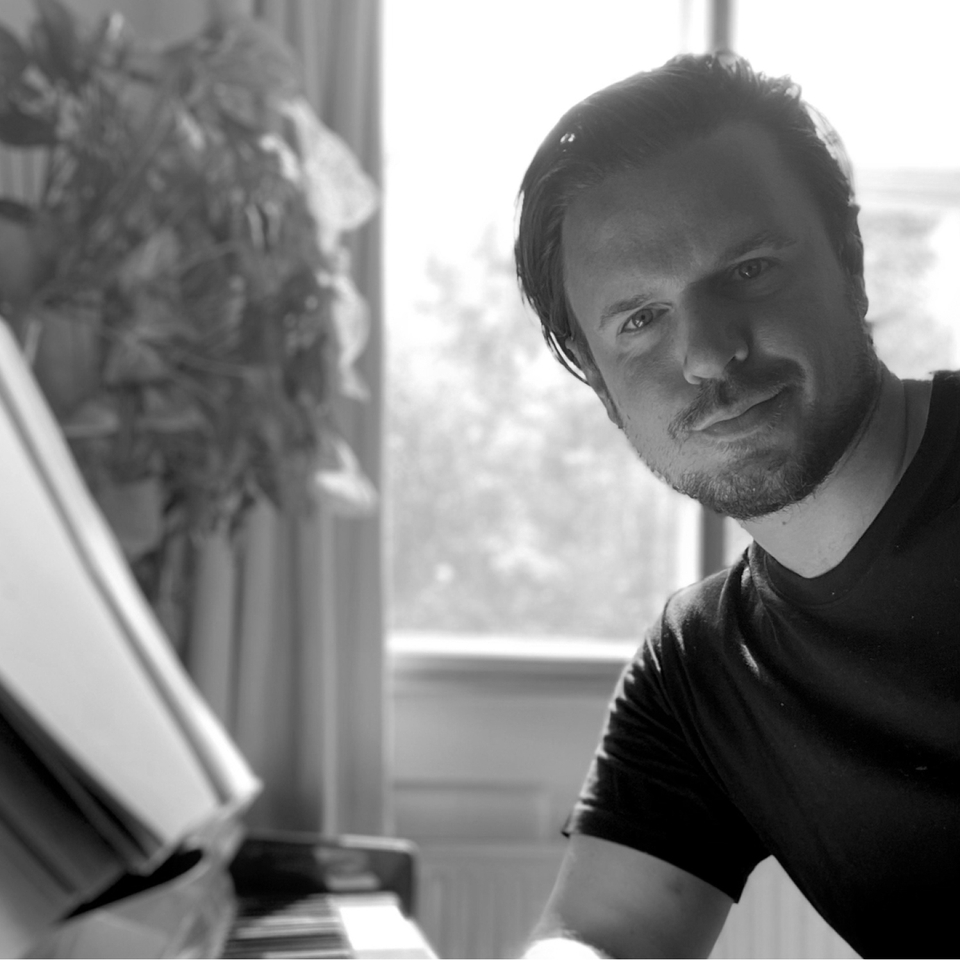
Saith Air y Groes
I ganol tawelwch Dydd Gwener y Groglith, byddwn yn offrymu’r perfformiad cyntaf yn y byd o Saith Air y Groes gan y cyfansoddwr, Alex Mills – gosodiad corawl o eiriau olaf Crist o’r Groes, wedi’i wreiddio yn iaith a diwylliant Gogledd Orllewin Cymru, ac wedi’i gomisynu ar gyfer yr Wythnos Fawr gan y Gadeirlan. Bydd y gair mawr, tyngedfennol hwnnw, “Gorffenwyd,” yn atseinio.
Saith Air y Groes • Seven Last Words from the Cross, Alex Mills
Côr Cadeirlan Deiniol Sant | Saint Deiniol’s Cathedral Choir
Ensemble 525
Joe Cooper, conductor

Alex Mills yn myfyrio ar y dasg o ysgrifennu'r cyfansoddiad newydd hwn yn sgil ei gomisiwn gan y Gadeirlan
Mae’n anrhydedd cael cyfansoddi Saith Air y Groes ar gyfer Côr Cadeirlan Deiniol Sant.
Mae cyfansoddwyr ledled y byd wedi bod yn gosod y saith ymadrodd byr hyn a lefarwyd gan Iesu o'r Groes ers o leiaf 500 mlynedd. Fodd bynnag, dyma un o'r achlysuron cyntaf, os nad y tro cyntaf un i hynny ddigwydd yn yr iaith Gymraeg. Teimlais felly ei bod yn bwysig iawn i mi angori’r comisiwn newydd hwn yn gadarn yng Nghymru, ac yn enwedig ym Mangor a’i Chadeirlan, cymaint â phosibl.
Cyn ysgrifennu nodyn o gerddoriaeth treuliais amser yn y Gadeirlan, yn mynychu ei haddoliad a chwrdd â'r Côr i'w clywed yn canu. Roedd hyn er mwyn i mi allu personoli’r darn cymaint â phosibl ar eu cyfer, ac mae wedi bod mor ddefnyddiol gallu dychmygu’r Côr yn canu’r gerddoriaeth wrth i mi ei ysgrifennu. Cefais groeso anhygoel gan y Côr a holl gymuned y Gadeirlan – cynhesrwydd yr wyf wedi’i gludo gyda mi wrth i mi ddechrau cyfansoddi. Rwyf wedi gweithio'n agos gydag Is-Ddeon y Gadeirlan ar y testun ar gyfer y darn. Mae eu hawgrym gwych o gynnwys rhai adnodau o Salmau perthnasol o Salmau Cân Edmwnd Prys (offeiriad o’r esgobaeth, ac un o’r genhedlaeth gyntaf o'r cyfieithwyr Beiblaidd, y mae pedwar can mlwyddiant eu marw eleni) wedi ychwanegu dimensiwn teimladwy a hanesyddol i'r cyfansoddiad. Rwyf hefyd yn cael fy ysbrydoli gan Esgoblyfr Bangor, llawysgrif eithriadol o Fangor y Canol Oesoedd sy’n cynnwys plaengan sylweddol. Er nad wyf yn bwriadu defnyddio dyfyniadau plaengan uniongyrchol o’r Esgoblyfr yn y darn, mae’r siantiau wedi ysbrydoli alawon a fy agwedd at osod geiriau.
Yn ogystal ag ysgrifennu Saith Air y Groes sydd wedi’i drwytho ym mywyd y Gadeirlan, ddoe a heddiw, roeddwn hefyd yn gwybod o’r dechrau fy mod am ennyn ymdeimlad o agosatrwydd ac uniongyrchedd yn y gerddoriaeth. Rwy’n aml yn teimlo bod celf, pensaernïaeth a cherddoriaeth grefyddol mor syfrdanol, mor aruthrol, hyd yn oed mor arswydus, fel y gall mewn gwirionedd greu pellter rhwng y pwnc dan sylw a’r person sy’n dod ar ei draws.
Fodd bynnag, mae’r hyn rydyn ni’n ei ganfod yng ngeiriau olaf Iesu yn hynod bersonol. Dyma berson sy'n cael ei wthio i derfynau absoliwt bregusrwydd dynol, ar drothwy marwolaeth, a thragwyddoldeb. Mae’r gerddoriaeth rydw i’n ei hysgrifennu yn addas o ddwys, ond mae hefyd yn fyfyriol iawn, a hyd yn oed yn obeithiol – er gwaethaf tywyllwch y Croeshoeliad. Yn y pen draw, rwy'n bwriadu i bob symudiad ddarparu rhyw fath o fyfyrdod ar y testun a allai ddod â ni'n agosach at berthnasedd parhaus a chyffredinol Saith Air y Groes.
Saith Air y Groes
Into the silence of Good Friday, we offer the world premiere of Alex Mills’s Saith Air y Groes – a choral setting of the Seven Last Words from the Cross, grounded in the language and culture of North-West Wales, and commissioned by the Cathedral for this Holy Week. “Gorffennwyd – it is finished,” will resound.
Saith Air y Groes • Seven Last Words from the Cross, Alex Mills
Côr Cadeirlan Deiniol Sant | Saint Deiniol’s Cathedral Choir
Ensemble 525
Joe Cooper, conductor

Alex Mills reflects on the task of composing this new piece in response to a commission from the Cathedral
It is such an honour to be composing Saith Air y Groes • Seven Last Words from the Cross for Saint Deiniol's Cathedral Choir.
Composers around the world have been setting these seven short phrases uttered by Jesus from the Cross for at least 500 years. However, this will one of, if not the first in the Welsh language. It therefore felt very important for me to anchor this new commission firmly in Wales, and especially in Bangor and its Cathedral, as much as possible.
Before writing a note of music I spent time at the Cathedral, attending its worship and meeting the Choir to hear them sing. This was so that I could personalise the piece as much as possible for them, and it has been so helpful to be able to imagine the Choir singing the music as I write it. I was made to feel incredibly welcome by the Choir and the whole Cathedral community – a warmth that I have carried with me as I have started writing the piece. I have worked closely with the Cathedral's Sub-Dean on the text for the piece. Their wonderful suggestion of including some fragments of relevant Psalms from the Welsh translations by Edmwnd Prys (a priest of the diocese, and one of the first generation of Bible translators, whose four-hundredth anniverary falls this year) has added a touching and historic dimension to the piece. I’m also drawing inspiration from the Bangor Pontifical, an exceptional manuscript from the medieval Diocese of Bangor that contains substantial plainchant. While I do not plan to use direct quotes of plainchant from the Pontifical in the piece, the chants have inspired melodies and my approach to word-setting.
As well as writing a Saith Air y Groes steeped in the life of the Cathedral, past and present, I also knew from the beginning that I wanted to evoke a sense of closeness, intimacy and immediacy in the music. I often feel that religious art, architecture and music is so awe-inspiring, so monumental, even formidable, that it can actually create distance between the subject matter and the person encountering it.
However, what we encounter in Jesus’s last words is extremely personal. It’s a person pushed to the absolute limits of human vulnerability, on the cusp of death, and transcendence. The music I am writing is fittingly solemn, but it is also deeply reflective, meditative, and even hopeful – despite the darkness of the Crucifixion. Ultimately, I am intending that each movement provides a sort of meditation on the text that might bring us closer to the enduring and universal relevance of Jesus's Seven Last Words from the Cross.
